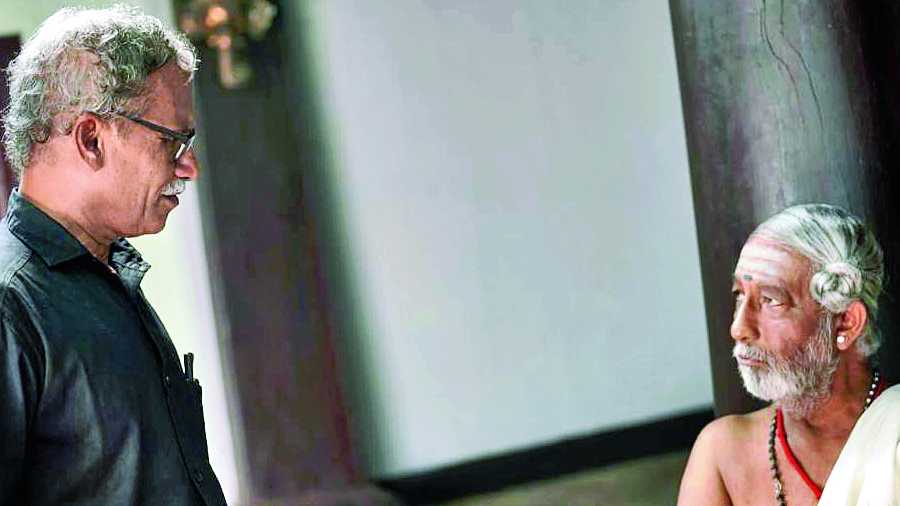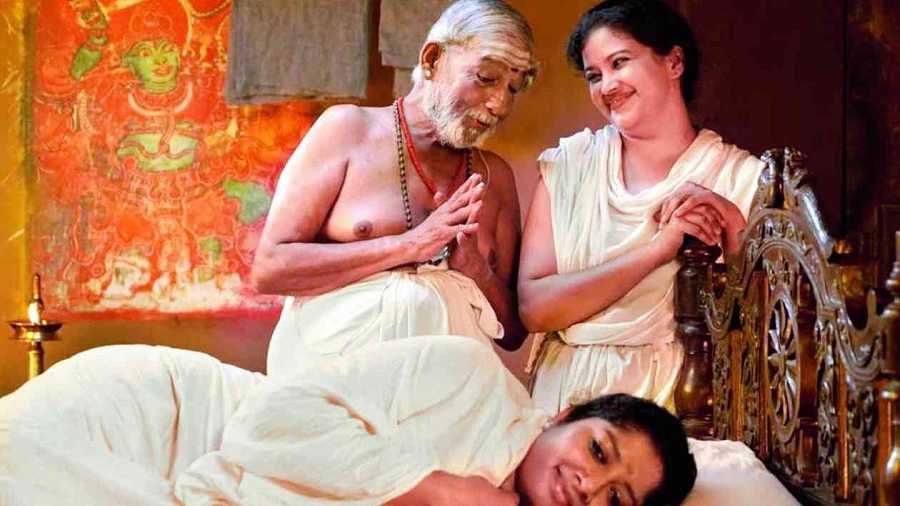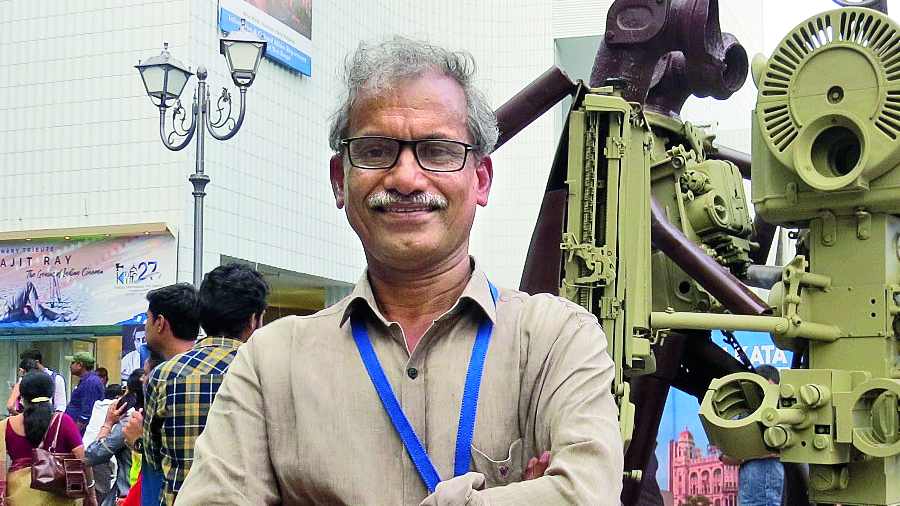A film in Sanskrit drew a full house at Nandan 2 on Saturday, the penultimate day of the 27th Kolkata International Film Festival.
Many came out of curiosity and everyone stayed glued to their seats as the tale unfolded on screen of the sexual exploitation of a virgin widow by Nambootiri Brahmin men a century ago and how revenge was extracted for her.
Taya, meaning “by her” in Sanskrit, is G. Prabha’s second feature film. The academic turned to filmmaking while teaching Sanskrit at Loyola College, Chennai.
But his inspiration had come much earlier, in the 80s, when as a freelance journalist, he was watching K.N. Panicker’s plays in Sanskrit. “He chose popular stories and adopted innovative dramatic techniques which attracted a serious audience. Since then, the idea of a Sanskrit film was on my mind.”
Already G.V. Iyer had made Adi Shankaracharya, India’s first Sanskrit feature film, in 1983. Then in 1993, he followed it up with Bhagavad Gita, also in Sanskrit. “Both were based on the scriptures. But I wanted to present a socially relevant subject,” said the native of Kerala, who writes fiction in Malayalam and lives in Chennai.
He cut his teeth as a filmmaker with documentaries Akkitham, a biopic on the Malayalam poet Akkitham Achyuthan Nambootiri in 2010, and Agnaye in 2012.
Then after retirement, he made his first feature film Ishti in Sanskrit, which opened the Indian Panorama in the feature film section at IFFI Goa 2016.

Director G. Prabha with his lead actor Nedumudi Venu on the sets. Sourced by The Telegraph
Cut off from life
Prabha feels the present disconnect of Sanskrit from day-to-day life is the result of a mistake of people who handled the language. “It was never a Brahminical language. Kalidasa was a shepherd, Vyasa was from the fisherman class, Valmiki was a forester... Sanskrit was the pan-India language, from Afghanistan to Kanyakumari, not Hindi. Works in Sanskrit have originated from all corners. Unlike other Indian languages, this language has no territory. Its popularity plummeted as some people refused to share it with other classes and communities,” he argued.
Language, he stressed, is a means of communication, and should not be limited by religious narrowmindedness. Sanskrit, he pointed out, has given us texts on all kinds of subjects — Kamasastra (art of love), Chorasastram (art of theft), Arthasastram (art of finance)... “Who says it is only for puja?” he wondered.
Prabha chose Sanskrit for his films as he felt both the stories dealing with the Nambootiri community were most amenable to Sanskrit. His male lead in both films, Nedumudi Venu, knew Sanskrit. “I taught the others as they could not enact the scenes without knowing the meaning of the dialogues,” Prabha said.

A still from the Sanskrit film Taya that was screened at the Kolkata International Film Festival on Saturday Sourced by The Telegraph
A crude custom
In the film, a 78-year-old marries a 20-year-old girl, younger than his daughter. But after his death within a few months, she gets confined to a room according to the custom. There she is victimised by scores of men from the clan, starting with her own son-in-law.
The situation was not uncommon as only the eldest son in Nambootiri families could inherit property and marry from the same elite caste. The younger men had affairs with women from lower castes but the children of those unions were untouchables even to their own Nambootiri father.
This restriction also meant that the majority of the Nambootiri women did not find a suitable groom. The solution was polygamy for the eldest son, often with women of disparate age as shown in the film. Many families had such a room where their hapless widows or unmarried women were buried away from public eye, only to become sex slaves.
Seeking to escape from this hell, the young widow decides to spread the news that she is a prostitute. This, she knew, will lead to smarthavicharam, an inquisition by a kangaroo court that examined the moral conduct of women from the Nambootiri clan to keep up a pretence of high moral standards.
“She knew it would lead to her expulsion from the community but she collected evidence against each molester — first-night gifts that she took, marks in their private parts etc. — which would result in them being banished as well,” the director said
The story is inspired by a landmark trial in 1905 involving the widow Kuriyedath Thathri that had shaken the patriarchal high caste community to its roots. Back then, the trial was abruptly stopped when the king conducting the trial realised that he was the next man Thathri would name.
Prabha veers away from the real-life episode in some respects to add cinematic venue. Here the victim is Arya, who collects the evidence against her molesters but is killed by them before her trial. It is her friend Savitri who gets her justice later. The king is replaced by a judge, who meets Savitri privately with a request to hand over the evidence against him. “In the film, Savitri fights against the atrocities of the patriarchal community as also questions the judiciary,” Prabha said.
The death of the three-time National Award-winning Venu last October is a “highly personal loss” for Prabha. In Taya, Venu plays an old scholar from the Nambootiri clan who is one of the molesters of a young widow and is instrumental in killing her. “Whenever I think of a Sanskrit film, he is the backbone. He had experience in Sanskrit drama and was a great actor who loved the language. This is a permanent vacuum. Now I am wondering who to replace him with in my third film,” he said.
